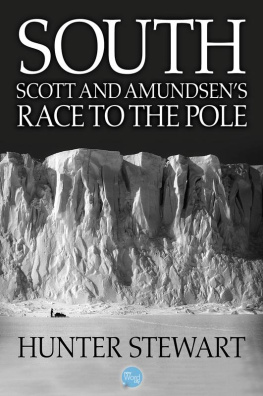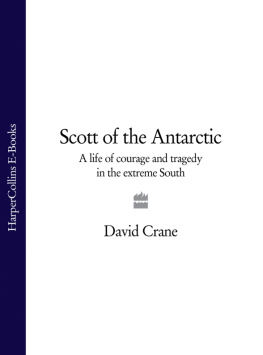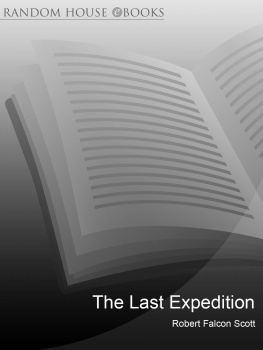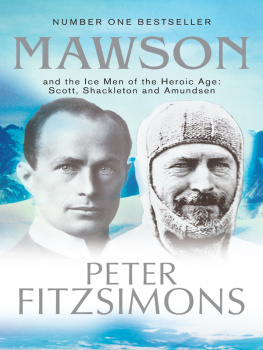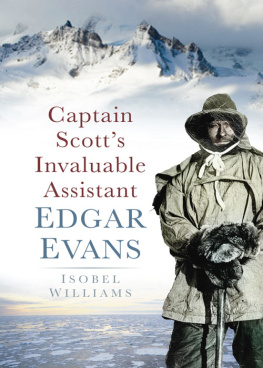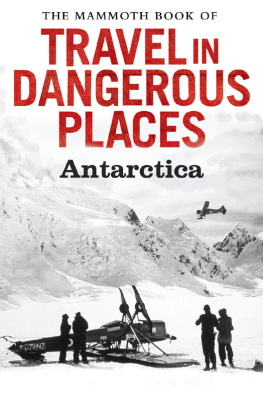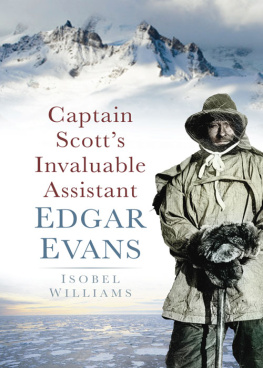
I may not have proved a great explorer but we have done the greatest march ever made and come very near to great success.
Robert Falcon Scott

First published in Great Britain in 2012 by
Pen & Sword Discovery
an imprint of
Pen & Sword Books Ltd
47 Church Street
Barnsley
South Yorkshire
S70 2AS
Copyright Sue Blackhall 2012
ISBN 978-1-84884-664-7
ISBN 978-1-84468-395-6 (ebook)
The right of Sue Blackhall to be identified as Author of this Work has been asserted by her in accordance with the Copyright, Designs and Patents Act 1988.
A CIP catalogue record for this book is available from the British Library.
All rights reserved. No part of this book may be reproduced or transmitted in any form or by any means, electronic or mechanical including photocopying, recording or by any information storage and retrieval system, without permission from the Publisher in writing.
Typeset in 11pt Ehrhardt by
Mac Style, Beverley, E. Yorkshire
Printed and bound in the UK by MPG
Pen & Sword Books Ltd incorporates the Imprints of Pen & Sword Aviation, Pen & Sword Family History, Pen & Sword Maritime, Pen & Sword Military, Pen & Sword Discovery, Wharncliffe Local History, Wharncliffe True Crime, Wharncliffe Transport, Pen & Sword Select, Pen & Sword Military Classics, Leo Cooper, The Praetorian Press, Remember When, Seaforth Publishing and Frontline Publishing.
For a complete list of Pen & Sword titles please contact
PEN & SWORD BOOKS LIMITED
47 Church Street, Barnsley, South Yorkshire, S70 2AS, England
E-mail: enquiries@pen-and-sword.co.uk
Website: www.pen-and-sword.co.uk
The Moulding of an Explorer
One could never have imagined that Robert Falcon Scott, the day dreamer with his childhood discomfort of blood and seeing animals suffer, would one day have to confront both of these great anxieties in a most tragic and legendary way. But then the young Scott with his rather awkward approach to life could never have envisaged embarking on an adult venture that would immortalise him as a great British hero.
Scott was born on 6 June 1868 into the privileged background of a family with a large estate and a father who was a magistrate. He was one of six children, with younger sisters Katherine (Kitty) and Grace (Monsie), younger brother Archibald (Archie) and two older sisters Ettie and Rose. Scotts parents were John Edward and Hannah. John came from a large family and was the youngest of eight children. He had four older brothers, one of whom died young, two who went into the Indian army and the other who became a naval surgeon. John himself was blighted with poor health, which prevented him from following the family tradition of entering the services. But he was fortunate to inherit a small brewery in Plymouth that his father Robert and uncle had bought for 4,782 out of prize money received during the Napoleonic wars. In fact, Robert Scott senior was the first of the family to settle in Plymouth. He was of Scottish descent with an ancestry full of military service. Oatlands, the family estate, was bought in 1819 and for a while was home to three generations of Scotts (and a great aunt) until John inherited it upon his fathers death.
Outlands provided a most pleasant life for the Scott family. Situated near Stoke Dameral, just outside Devonport in Devon, it boasted a stream at the bottom of the garden, three large greenhouses, peacocks on the lawn and a small staff of maids and gardeners. John had married Hannah Cuming, the daughter of William Bennett Cuming of Plymouth, in 1861. It was a highly respectable match as Hannahs father was a Lloyds surveyor, Commissioner of Catwater Pilotage, Commissioner for the Catwater Improvement and a member of the Chamber of Commerce. The naval link between the two families (Scotts grandfather and four uncles had all served in the army or navy) was further forged when one of Hannahs brothers, Harry, became a Vice-Admiral.
Life for the Scotts was to change dramatically but during their childhood it was idyllic. John was an easy-going and patient father despite the occasional outburst of temper and Hannah, a woman of strong religious principles, was adored by her children. Even in adult life Robert referred to her as the dear mother.
In accordance with family tradition Robert and Archie were destined for careers in the armed services. Robert was educated first in the nursery at home and then for four years at a local day school. He was also a choirboy at St Marys Church in Ford. Nicknamed Con by his family, little Robert would often go into silent flights of fancy (whether any of these daydreams involved one day being an Antarctic explorer one will never know), and despite his best efforts, concentration would often be interrupted by private thoughts. He was also shy and diffident, and according to one biographer was small and weakly for his age, lethargic and backward. Not an auspicious beginning for a man who was to become a schoolboy hero.
Robert was later sent to Stubbington House School in Fareham, Hampshire, a cramming establishment that prepared candidates for the entrance examinations to the naval training ship HMS Britannia at Dartmouth. (The first of the two HMS Britannias that served as naval training ships was in operation between 1859 and 1909. Scott trained on the second, which came into service in 1869). Stubbington House School was founded as a boys preparatory school in 1841 by Reverend William and became known as Fosters Naval Academy. It gained a reputation in the late nineteenth century as the recognised place for coaching towards a naval cadetship. Indeed, as well as Robert Scott the academy boasted Andrew Cunningham, 1st Viscount Cunningham of Hyndhope and First Sea Lord, Lieutenant-Colonol Angus Falconer Douglas-Hamilton VC, army officer and posthumous winner of the Victoria Cross, fellow Victoria Cross winner Sir Anthony Cecil Capel Miers and, in latter years, John Sandy Woodward, naval officer and Falklands Task Force Commander as its former cadets. The school moved to Ascot in Berkshire in 1966 and eventually closed its doors on 7 July 1997. The former school site in Stubbington has been redeveloped as a community centre. The schools name has been preserved and re-registered as a limited company by one of the schools former assistant masters in the expectation of it one day being reestablished as a traditional boys prep school.
The young Scott passed his examinations in July1883 coming seventh out of a class of twenty-seven and emerged from HMS Britannia as a midshipman, thus becoming equipped to begin his naval career as a cadet. By October he was en route to South Africa to join HMS Boadicea, the flagship of the Cape Squadron and the first of several ships on which he served during his midshipman years. HMS Boadicea was one of four ships to bear that name. The first was a 338-gun fifth-rate launched in 1779 and used for harbour service from 1854 until being broken up in 1858. Scotts Boadicea was a Bacchante class corvette launched in 1975 and was to be his home for two years while he served as a midshipman earning around 30 a year. It was a hard life and training under naval instructors was intense for the cadets, with beatings and extra drill as the punishment for misdemeanours. The young lads were up aloft (working in the rigging 120ft above deck) in all sorts of weather and away for long hours in boats under oars and sail. There were no bathrooms and bed was a hammock. One can only imagine how this harsh regime took its toll on a sensitive boy who had known only great comfort and privilege. Robert had to grow up fast, taking his beatings like a man, learning how to obey orders without question and overcoming his weaknesses and homesickness. His reputation as a bit of a day dreamer earned him the nickname old mooney.




